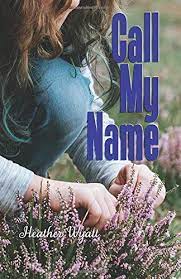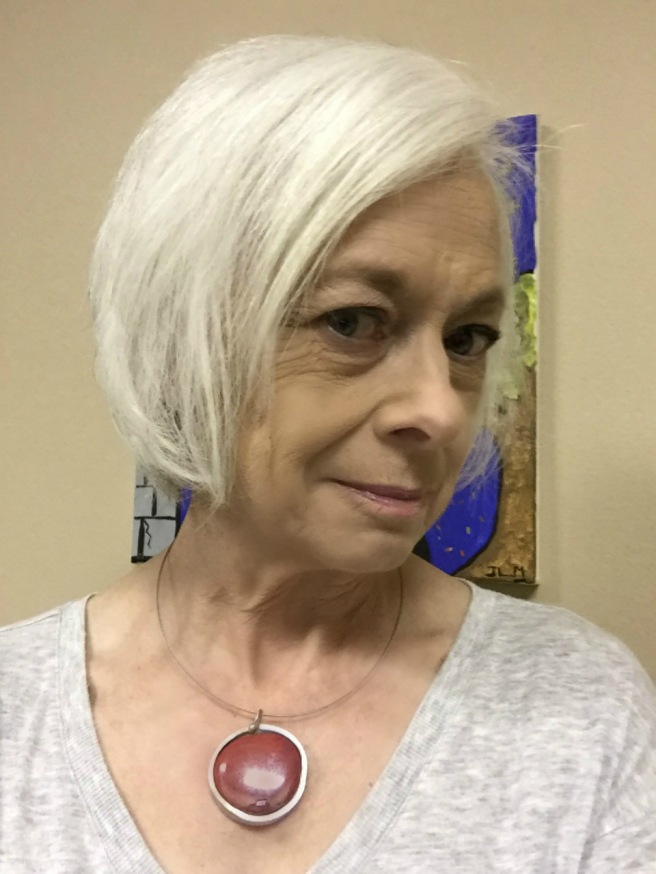Call My Name, by Heather Wyatt
Review by Diane Elayne Dees
It’s hard to ignore a chapbook that includes a poem whose first line is: “I saw my ass on the news last night.” Heather Wyatt’s Call My Name (The Poetry Box, 2019) is filled with such detailed observations, often delivered with skillfully detached humor, and always presented with rich and precise imagery.
In “File Footage,” the above-referenced poem, Wyatt writes:
Almost like a heart, it bobbled,
a teeter totter unaware of the camera.
This isn’t good. I said to myself.
I put down the cookie dough.
I predicted this would happen one day.
Call My Name is part memoir, in that the author sometimes takes us back to her childhood and some of the important characters who shaped it. It is also a collection of her keen observations of everyday events and objects—things that make up a major part of our lives, but which we may tend to ignore. Wyatt pays close attention to them, and reminds us that they have meaning, even if we have sometimes been unable to find the words to convey that meaning. In “Nostalgic Scroll,” she runs through a list of sensory memories:
miniature teapot I begged my mother for after Aunt
Frances died
yellow crocheted purse from Great-Grandmother Maude
fallen hair from Barbie on Salon day
sand dunes perched on the coast of North Carolina
littered with kites donning images of
superheroes
sixteenth century forts, lighthouses bigger than life
and miles of white beaches in St. Augustine
And in “Full of Grace,” she laments the unfortunate existence of a neglected statue of the Blessed Virgin Mary:
Made of stone,
she stands prim,
high, cream
stone against
the brick wall,
nailed
to a black
L bracket
looking over
the leather
teal sofas,
and the television that never stops running
the news ticker.
I lived in New Orleans for much of my life, so I was immediately drawn to “After My Second Hurricane,” in which Wyatt perfectly captures the city’s sometimes shocking ambience:
The streets of New Orleans smell
like old trash filled
with aged, Creole spices. . .
. . . Purple and gold beads
were flying at my head.
The author’s childhood memories include finding her grandfather’s golf bag in the attic, digging “to China” in the red mud of her yard, eating canned ravioli and watching The Price is Right at her grandparents’ house, and losing control of her crutches and falling down twice at her great-grandmother’s funeral. In every case, these memories are enhanced by Wyatt’s keen use of imagery and her attention to detail, as they are in the poem, “The Price is Right”:
Grandpa would
pluck the strings
on his guitar
until he heard
creaking floor boards
that meant Grandma
was coming to tell
him to stop.I spent every
summer this way,
reclining, looking
at the wood paneling
on the walls.
One of the most poignant poems in the collection is “A Caged Bird,” in which the author describes a sick bird:
Your curled beak and nails
grasp at the wires—
you squawk when you can
catch your breath,
The latch that keeps you caged
comes unhinged and the door opens.You don’t leave.
Even more affecting is the haunting title poem, “Call My Name,” which is the first poem in the chapbook. In “Call My Name,” Wyatt describes the failing mental and physical health of her aunt, who is in a nursing home. But the poem is really about the author’s reaction to witnessing the demise of her family member:
This is not the first
or last poem I will write
about you.
This time I am trying
to decide what I want
from your house
that you can’t fit
in your tiny room.
How can I choose
what I want
to take with me?We haven’t even had
a funeral for you.
The poet describes the patient’s condition in painful and startling detail, such as in this passage:
The closet is your refrigerator
and you are on the kitchen floor
and you are in the fabrics department
and you are working.
You fold the same stiff, sterile sheet
for hours and look desperately
at the oxygen machine to give
you a price for the discounted fabric.
Wyatt’s poetry is spare and focused, transporting the reader directly to the scene, and all of the emotions and sensations surrounding it. Call My Name is evocative, emotive and and often humorous. Heather Wyatt closely observes everything, including herself, in this beautifully written collection. The result is poetry that nudges our memories, validates our feelings about events large and small, and calls us to be observers of our own experiences.

Heather Wyatt is a teacher and writer by day and food TV junkie by night. Her first book, My Life Without Ranch, from 50/50 Press features that love of food, but also explores the dangerous relationship we can all have with it. She lives in Tuscaloosa, Alabama and has a slight obsession with her two dogs. She both graduated from and instructs English at the University of Alabama.
She received her MFA from Spalding University in Louisville, Kentucky in poetry. Several of her poems have been featured in a number of journals including Number One, Puff Puff Prose Poetry , The Binnacle, ETA, Writers Tribe Review and many others. Her short story “A Penny Saved” was published in Perspectives Magazine in 2018. Her essay “Self-Defense” is in The Doctor T.J. Eckleburg Review, September 2018 and her essay, “Hot AF” is in the magazine Robot Butt.
Follow her on Twitter @heathermwyatt or visit her website at heathermwyatt.com for more information.


Diane Elayne Dees’s poetry has been published in many journals and anthologies. Diane is the author of the chapbook, Coronary Truth (Kelsay Books) and the forthcoming chapbooks, I Can’t Recall Exactly When I Died, and The Last Time I Saw You. Diane, who lives in Covington, Louisiana, also publishes Women Who Serve, a blog that delivers news and commentary on women’s professional tennis throughout the world. Her author blog is Diane Elayne Dees: Poet and Writer-at-Large.
Risa Denenberg is the curator at The Poetry Cafe Online.

